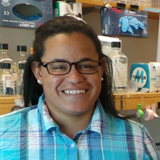PHILADELPHIA—Donita C. Brady, PhD, the Presidential Assistant Professor of Cancer Biology in the Perelman School of Medicine at the University of Pennsylvania, has been recognized by The Pew Charitable Trusts as one of its 22 Pew Scholars in Biomedical Sciences. The 2016 class of Pew Scholars comprises exceptional early-career scientists drawn from prestigious institutions across the country, with each scholar receiving four years of flexible funding to pursue foundational, innovative research.

Donita C. Brady, PhD
“It’s truly an honor to have been selected as a 2016 Pew Scholar in Biomedical Sciences,” Brady said. “I am thrilled to be part of the Pew community at Penn.”
Brady’s research looks at the links between cancer and copper, with enormous potential for the development of future cancer treatments. As part of her postdoctoral fellowship, she and a team of Duke University researchers discovered that reducing the body’s supply of copper also blocks the growth of certain kinds of cancers – specifically, cancers with a mutation in the BRAF gene that require copper for the growth of cells and tumors. This class of cancers includes melanoma, one of the most common and deadly forms of skin cancer, as well as colon, lung, and thyroid cancers. Brady’s research has significant clinical implications, including the use of existing drugs for Wilson’s disease, a rare genetic disorder in which the body accumulates too much copper.
Brady was a senior research associate in the department of Pharmacology and Cancer Biology at the Duke University School of Medicine, following a five-year postdoctoral fellowship before arriving at Penn. She earned her doctorate in Pharmacology from the University of North Carolina at Chapel Hill.
“For more than thirty years, The Pew Charitable Trusts has proudly supported outstanding biomedical researchers at the start of their careers, encouraging the kind of creativity that leads to remarkable discoveries,” said Rebecca W. Rimel, president and CEO of The Pew Charitable Trusts. “The members of this exemplary group join a community of scientists that they will learn with, and learn from, for the rest of their lives.”
Visit the Pew program page to read the scholars’ full abstracts and learn more about the program.
Penn Medicine is one of the world’s leading academic medical centers, dedicated to the related missions of medical education, biomedical research, excellence in patient care, and community service. The organization consists of the University of Pennsylvania Health System and Penn’s Raymond and Ruth Perelman School of Medicine, founded in 1765 as the nation’s first medical school.
The Perelman School of Medicine is consistently among the nation's top recipients of funding from the National Institutes of Health, with $550 million awarded in the 2022 fiscal year. Home to a proud history of “firsts” in medicine, Penn Medicine teams have pioneered discoveries and innovations that have shaped modern medicine, including recent breakthroughs such as CAR T cell therapy for cancer and the mRNA technology used in COVID-19 vaccines.
The University of Pennsylvania Health System’s patient care facilities stretch from the Susquehanna River in Pennsylvania to the New Jersey shore. These include the Hospital of the University of Pennsylvania, Penn Presbyterian Medical Center, Chester County Hospital, Lancaster General Health, Penn Medicine Princeton Health, and Pennsylvania Hospital—the nation’s first hospital, founded in 1751. Additional facilities and enterprises include Good Shepherd Penn Partners, Penn Medicine at Home, Lancaster Behavioral Health Hospital, and Princeton House Behavioral Health, among others.
Penn Medicine is an $11.1 billion enterprise powered by more than 49,000 talented faculty and staff.